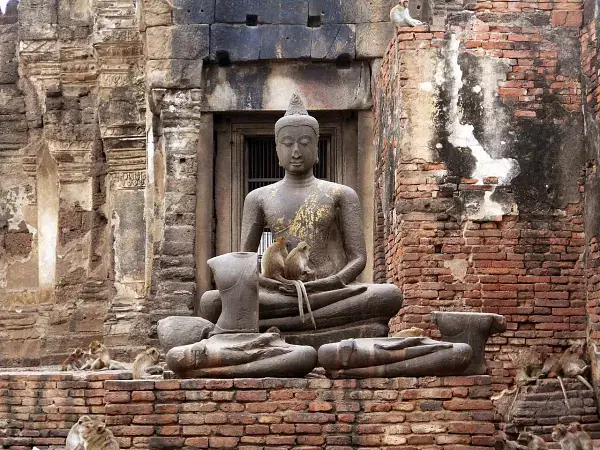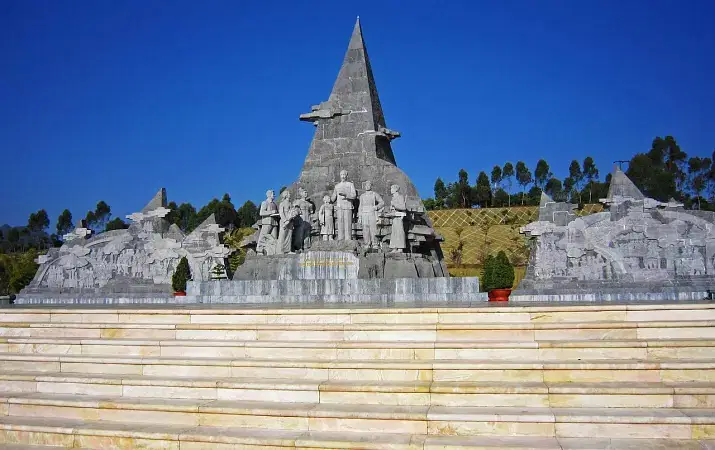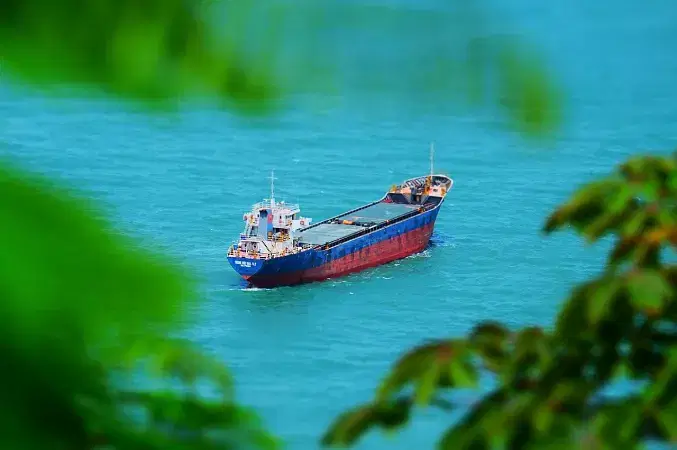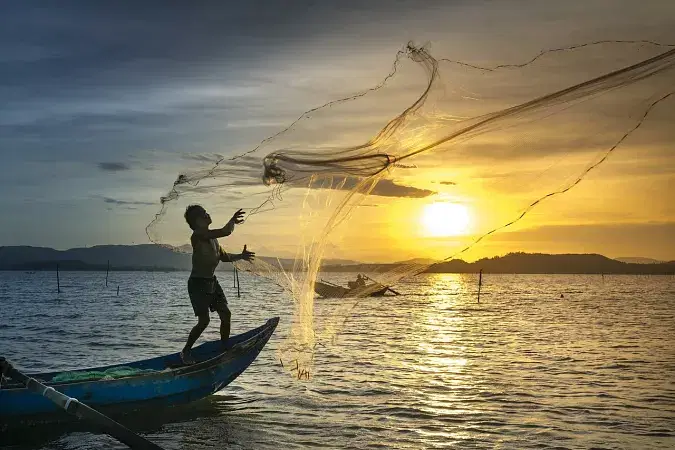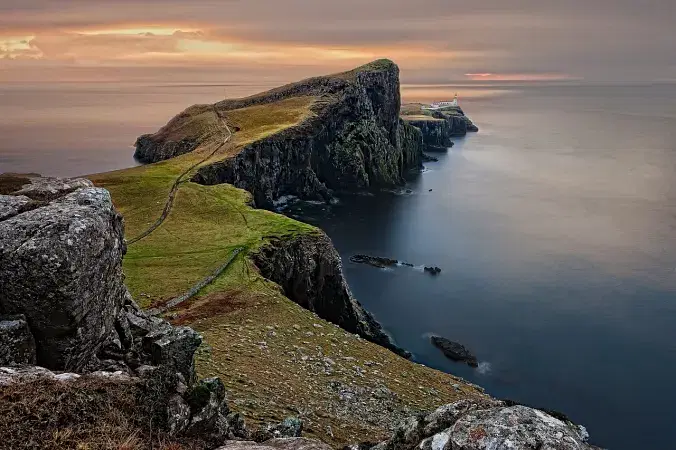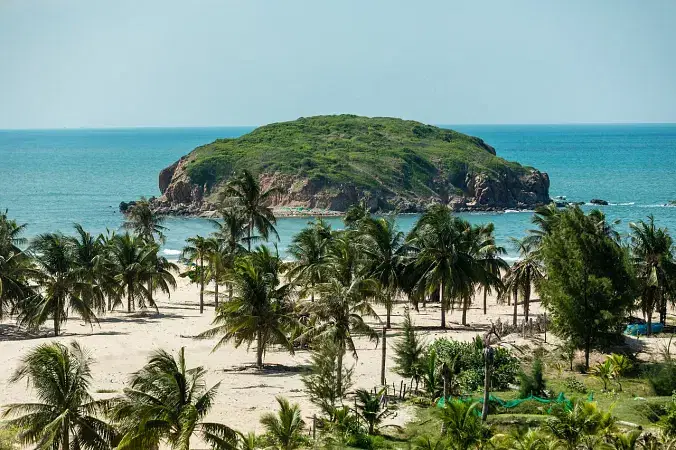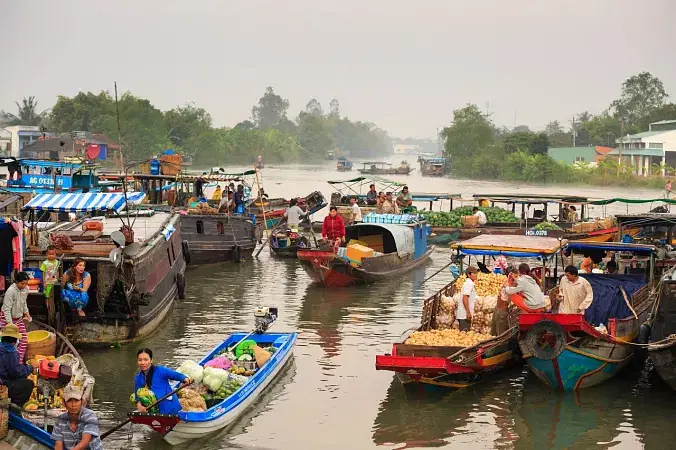
Mekong Delta Travel Guide
Mekong Delta, located in southern Vietnam, is a vast maze of rivers, swamps, and islands. Known as the "Rice Bowl" of Vietnam, it is a region of immense cultural and historical significance. The delta is famous for its floating markets, where locals buy and sell goods from boats, and its lush fruit orchards. Visitors can explore traditional villages, enjoy boat rides along the river, and savor the unique cuisine of the region.Top Attractions in Mekong Delta
- Cai Rang Floating Market
- Ben Tre Province
- Vinh Trang Pagoda
- Thoi Son Island
- Tra Su Cajuput Forest
Mekong Delta is Famous for
Rice cultivation and floating markets.Top Attractions in Mekong Delta
- Exploring the floating markets
- Tasting fresh tropical fruits
- Visiting traditional villages
- Taking boat cruises along the river
- Experiencing the vibrant local culture
What's Great about Travelling to Mekong Delta?
- Rich cultural experiences
- Scenic river landscapes
- Authentic Vietnamese cuisine
What's Not So Great about Travelling to Mekong Delta?
- High humidity levels
- Language barrier in remote areas
- Mosquitoes and other insects
Travel Tips for Mekong Delta
- Obtain a visa before arrival
- Use reputable tour operators for boat trips
- Stay hydrated and protect against mosquitoes
Important Mekong Delta trip information
- Ideal Duration: 3-4 days
- Best Time to Visit: November to February
- Nearby Airports and Railway Stations: Can Tho International Airport, My Tho Railway Station
FAQ's on Mekong Delta
Q1: What is the best time to visit Mekong Delta?
The best time to visit Mekong Delta is during the dry season, from December to April, when the weather is sunny and warm. This period allows for smooth boat rides along the Mekong River and exploration of the lush greenery. However, if you wish to witness the bustling floating markets in full swing, plan your visit during the wet season from May to November. Keep in mind that this time of year can be humid with occasional rain showers.
Q2: Do I need a visa to travel to Mekong Delta?
Most visitors need a visa to enter Vietnam, where Mekong Delta is located. However, exemptions apply to certain countries for short stays. It is advisable to check with the Vietnamese Embassy or consulate in your country to confirm the visa requirements and apply in advance if needed.
Q3: What are the must-visit attractions in Mekong Delta?
Mekong Delta offers a rich tapestry of attractions, including the vibrant Cai Rang Floating Market, the serene An Binh Island, the historical Vinh Trang Pagoda, and the lush Tra Su Cajuput Forest. Don't miss out on experiencing the local life in the riverside villages and trying the delicious fresh fruits at the orchards.
Q4: Is Mekong Delta a safe place to travel?
Mekong Delta is generally a safe destination for travelers. However, it's advisable to be cautious of petty theft in crowded areas and to avoid isolated places at night. It's recommended to keep your belongings secure and be aware of your surroundings. Stay updated on travel advisories and take necessary precautions during your visit.
Q5: What is the local currency in Mekong Delta and can I use credit cards?
The local currency in Vietnam, including Mekong Delta, is the Vietnamese Dong (VND). While credit cards are accepted in larger establishments like hotels and upscale restaurants, it's advisable to carry cash for smaller purchases and in rural areas. ATMs are widely available in major towns for your convenience.
Q6: What is the local cuisine like in Mekong Delta?
Mekong Delta boasts a diverse culinary scene with fresh seafood, tropical fruits, and flavorsome dishes. Indulge in local specialties like "Canh Chua" (sour soup), "Hu Tieu" (noodle soup), and "Banh Xeo" (sizzling pancakes). Vegetarians will also find plenty of options like "Bun Rieu" (crab noodle soup) and "Com Chay" (vegetarian rice).
Q7: What transportation options are available in Mekong Delta?
Transportation in Mekong Delta includes boats for river cruises, buses for intercity travel, and taxis for short distances. You can also rent bicycles or motorcycles to explore the region at your own pace. Public ferries are common for crossing the Mekong River, providing an authentic local experience.
Q8: Are there any cultural norms or etiquette I should be aware of when visiting Mekong Delta?
When visiting Mekong Delta, it's important to show respect for local customs and traditions. Remove your shoes before entering someone's home or a place of worship. Dress modestly when visiting temples or rural areas. It's polite to greet locals with a smile and a slight bow. Avoid pointing with your feet and be mindful of your gestures to show courtesy.
Q9: I am a travel agent. How can I buy travel leads of Mekong Delta?
Register yourself as a travel agent at agents.tripclap.com and then you can buy travel leads to Mekong Delta once your account is approved. For more details contact our support team at +91-8069186564 or support@tripclap.com

